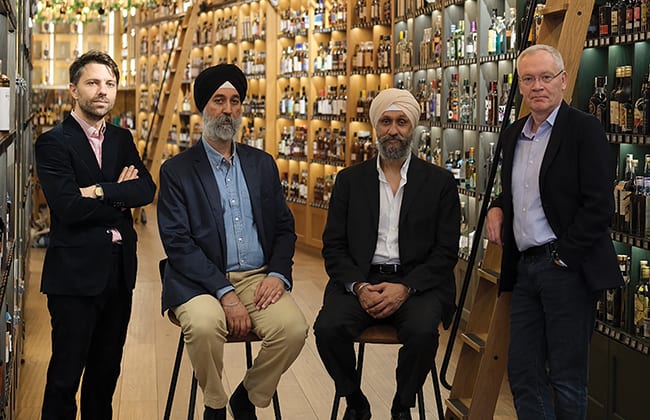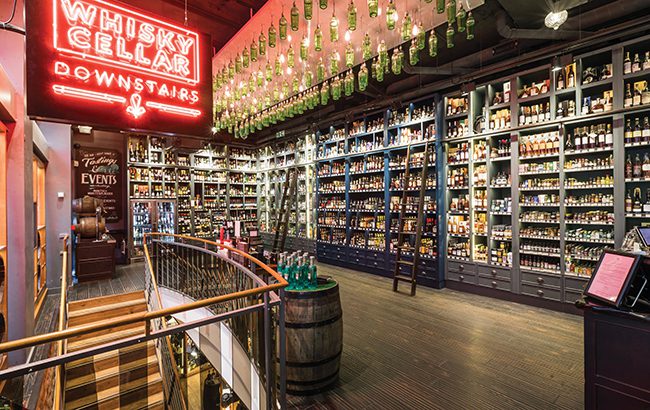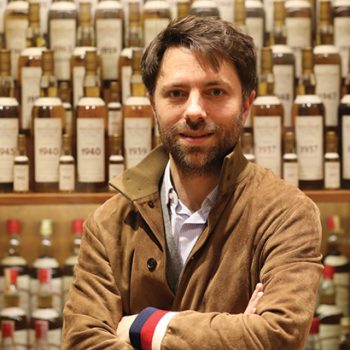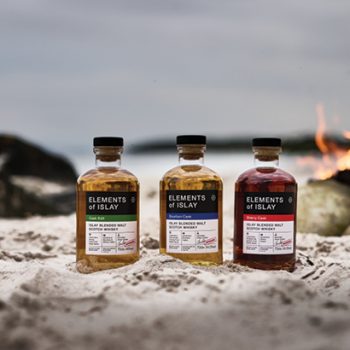Sukhinder Singh on selling The Whisky Exchange
Two years have passed since Pernod Ricard bought The Whisky Exchange. Melita Kiely speaks to the exiting owner and new CEO about what’s next.

*This feature was originally published in the July 2023 issue of The Spirits Business magazine.
Since its inception, The Whisky Exchange has been a family affair. Co-founded in 1999 by brothers Sukhinder and Rajbir Singh, the firm celebrated its 20th anniversary in 2019, when selling the business was far from their minds. “We’ve had a lot of enquiries, but we always say no,” Sukhinder told me at the time.
A lot changed between then and now, and in 2021, news broke that The Whisky Exchange had been bought by Pernod Ricard for an undisclosed sum. The sale included the online site, three London bricks-and-mortar shops, Whisky.Auction, Speciality Drinks, London Cocktail Week, and The Whisky Show.
“I’d been to a lovely seminar with the Worshipful Company of Distillers,” Sukhinder explains, “which was about family companies versus being corporate. And, of course, I went into this thinking I was on the side of family company. It was interesting because I would say 70%-80% of the audience were all with a family company. But at the end of the evening, everyone swayed over to the big corporates because what they said was family companies can take a business to a certain point. But big companies can take those companies and globalise, and take them to the next level, which family companies will take a long time to do. That resonated quite a lot.”
In good hands
Afterwards, selling the business to the right like-minded company didn’t seem so unthinkable; in fact, the more Singh considered the options “it made sense”. Talking about his and his brother’s decision to sell the company to Pernod Ricard, he says: “We were happy we were going to give it to someone in good hands, a company that has similar family values to us.”
Since the acquisition, the founders have remained at the helm of The Whisky Exchange as joint managing directors to oversee an agreed two-year transition period. The pair officially relinquished their titles this month (October 2023), leaving the company in the hands of managing director Olivier Gasperin, who was appointed in March 2022, and Nicolas Oudinot, who joined Pernod Ricard in September 2022 as CEO of the company’s newly created direct-to-consumer business unit. The Whisky Exchange will remain a standalone business under this entity, alongside Bodeboca, a leader in premium wine online retailing in Spain, and Spanish firm Drinks & Co.
“If we take a step back, digital transformation has long been a focus for Pernod, not just online businesses, but also online data,” explains Oudinot, who boasts 10 years’ experience working in luxury fashion. “As part of this, the group has been investing over the past few years in acquisitions, having in mind that they would run in parallel with digital, direct-to-consumer initiatives.”
Fully independent
He describes The Whisky Exchange as a “one-of-a-kind” business. “It’s a rich and sophisticated ecosystem, with the site, the shops, the show, the on-trade part of it, the people behind it who have extraordinary knowledge and experience of what they are doing.”
Keeping the company as its own entity in the Pernod Ricard portfolio is essential to its future success, Oudinot assures. “We have our office, our tech, our HR, finance – everything is fully independent,” he says. “The reason for this is to maintain the independence and the neutrality of The Whisky Exchange and Speciality Drinks in their product choices and brand choices.”
The power and importance of e-commerce was never as apparent as during the pandemic, and Singh says that time accelerated the need for online sales. “If it wasn’t for online, all the drinks companies would have suffered; their sales would not have been close to where they were, apart from supermarkets, which are commercial,” Singh says. “Since then, everyone’s looking at e-commerce. LVMH partnered with Campari to buy Tannico in Italy. But like Nicolas was saying, the choice is quite restricted. How many big players are there in the sector? Not many.”
Oudinot assures that The Whisky Exchange will remain a specialist retailer. “We are not trying to compete with Amazon. We’re on the side of offering an experience; it’s about the passion and the emotion, it’s not convenience,” he says.

Singh adds: “When you’re talking about specialist, it doesn’t matter what industry it is, everything is more about that handcrafted element, it’s knowledge-based, it’s expertise, and consumers want that education, they want that confidence and trust in what they’re going to be recommended.”
As such, the three London shops will remain a key part of the business, both Singh and Oudinot confirm. “These stores are very special,” Oudinot says. To him, they are a gateway to get consumers to try more products, to create a tangible means of helping people better understand what they are buying and drinking.
“The Whisky Exchange is not a retailer that is based on random incoming traffic, it’s a destination for people who are looking for something special,” Oudinot says. “This is unique, and obviously it is part of the expansion recipe, so we are looking into store additions. It has to be very well evaluated and prepared, and we may not open hundreds of stores around the world but selective locations, potentially in the UK outside of London, or in key cities around the world. It’s absolutely something we’ll look at.”
Singh reiterates the importance of the human element that comes with the physical stores. The education offered at the shops will also stay: masterclasses in the evening, sit-down tastings, and more. The same goes for The Whisky Show, which has become an unmissable diary date for any whisky enthusiast. “All the ingredients are going to remain,” Oudinot insists. Where Pernod Ricard’s prowess will come into play is with the internationalisation of the business.
“All of this will continue growing, constantly pushing the boundaries to raise the bar,” he continues. “The idea is really to extend The Whisky Exchange globally. It is already a global company, but we will look at the elements we should dial up or dial down in various geographies, while ultimately keeping all the ingredients that make the company great the same.”
International growth

Can fans expect to see international editions of The Whisky Show? “Potentially, yes,” Oudinot says. “London is not just targeting local clientele; we already have an international reach. We will not run shows in every key city in the world, as it would not be sustainable. We are in the process of prioritising the geographies and deciding whether it makes sense.”
Online sales by value at The Whisky Exchange are split at around 60/40 between the UK and overseas. “If you look at it in volume, it’s much higher in the UK. It’s probably 80/20 between the UK and abroad, maybe even higher, 85/15. But if somebody from abroad is going to order something, it’s usually higher-value stuff,” Singh explains.
While Oudinot says Pernod Ricard is satisfied with the split, the “scenario now is to increase the international path. The UK market is tough at the moment, but over the longer term, I still believe there is room for growth in the UK,” Oudinot continues. “But obviously as we grow the company, the international part is going to increase.”
Brexit threw up myriad challenges for The Whisky Exchange, cutting its shipping abilities to just five countries in Europe. Singh says there is no difference in how a big corporation or a smaller, independent company can overcome the challenges of shipping from the UK post-Brexit. “The solutions are the same whether they did it or we did it,” he explains, “which is you have to open a hub in Europe and do it that way. Currently we’re shipping to five countries in Europe; that’s all we’re allowed to do. France, for example, is a big market, it’s an important market, and it’s sad that being the closest market to the UK we can’t ship there.”
Brexit challenges
“Pernod Ricard as a group does not have a magic wand to solve things that The Whisky Exchange alone would not have solved,” adds Oudinot, backing Singh’s previous point that the challenges are the same regardless of a company’s size and stature. “But what we can leverage at Pernod Ricard, and that’s why belonging to a group like that makes a lot of sense, is while The Whisky Exchange remains completely independent in running the business, and the product choice and the brand partnerships, Pernod Ricard has teams in literally all countries. We know the market lawyers, and the tax advisers. So when it comes to exploring a market, or finding out the right setup to open a hub, you have a group that has an extremely granular global footprint and knowledge of each market.”
As the next chapter in The Whisky Exchange’s future quickly approaches, Oudinot notes that the company will continue to work closely with Singh’s Speciality Brands and Elixir Distillers businesses. Singh credits how well Gasperin and Oudinot have integrated into the company and come to gain the trust of its employees. “Change can be difficult, and from a staff point of view, everyone was a bit nervous,” Singh admits. “But Olivier settled in very well, and he gained the trust of all the staff, and that is a testament on its own. It’s been seamless mainly for this reason – everything is about people. And with Nicolas on board, again, the team is getting to know him well, and the trust is there.”
Oudinot echoes Singh’s sentiment: “Thanks to the support of Sukhinder, and thanks to the team with its very strong expertise and passion, this has been a smooth transition. There’s a famous quote that says ‘everything has to change so that everything can stay the same’. We deeply want to preserve the core of the DNA of The Whisky Exchange ecosystem. But there are a number of things that need to change to call on the strengths of the company, and take it to the next level.”
Singh says the sale hasn’t quite felt real to him yet, so seamless and void of drastic changes has the transition been. When that “inevitable” time comes, there will be plenty to keep him and Rajbir busy – not least the building of their own distillery, Portintruan, on Islay in Scotland.
Portintruan developments
The distillery broke ground last September, and the past months have been busy laying the groundwork and foundations for the site, with steel work having been due to start at the end of June. Singh is excited to finally see the distillery take shape from here on in, but with the challenges that come with building on a Scottish island, he assures that “we’re not in any hurry. Touch wood, everything now seems to be on track. We’re working on finalising the interior designs. Hopefully it should all be built and ready by the end of next year; that’s the plan.”
Since June 2022, Singh and his brother have owned Tormore Distillery, which they acquired from Pernod Ricard. Built in 1960, the distillery had been under Pernod’s ownership since 2005. Singh explains that he approached Pernod looking for a Speyside distillery to complement his Islay plans.

“Pernod still needed liquid, so we have an agreement to supply some liquid back to them. We just took over in December, we’ve got a full new team in place,” he says, explaining there were just five people before the takeover, but two have stayed, and another “seven or eight” employees have been hired – including ex-Macallan whisky maker Polly Logan, who has joined as Tormore’s distillery manager.
Singh says Tormore is at capacity, with no room for expansion – a situation he is at peace with because “to be honest the stock is more than enough, if anything, we’ve got surplus. It’s hardly been used for single malts because it was predominantly for blends. That gives us a great opportunity to start afresh. Nobody knows the brand, which is brilliant. So we will look at packaging, and the liquid; we have tens of thousands of casks to work through to understand the liquid, then hopefully, in a year or so we will launch a product, a single malt under the name Tormore.”
Our conversation steers towards how the current economic climate could affect consumer buying habits and recent trends, particularly as incomes are being squeezed with the cost-of-living crisis. Will premiumisation continue, or will consumers with less disposable income be trading down?
The answer, for Singh, is multifaceted in the short term. He says there will be some trading down, but notes: “The wealthy are getting wealthier, and they’ll always remain wealthy. They have bought their houses; they still have disposable income. Premium people who want, will always be able to buy. I think you’ve also got the speculator, which has probably edged down a bit. The people who, when you’ve got zero interest in the bank, buy whisky or wine. I think the industry itself has to be very careful on the type of products they launch, that they’re not purely catering for the collector. They need to be liquid-first, so that the appeal is much broader. You always get glitches, but whisky is quite a stable, robust product.”
It’s a point both Singh and Oudinot agree on, that there is a bright, prosperous future ahead for the whisky industry – and that The Whisky Exchange and Elixir Distillers will be important players in its success.
Related news
Cocktail stories: Speed Bump, Byrdi
